 You may have heard the gossip and the waves that the book "Capital in the Twenty First Century" by Thomas Piketty is making. Every socialist "out there" is up in arms. Every bureaucrat is sniffing around. Every politician is salivating.
You may have heard the gossip and the waves that the book "Capital in the Twenty First Century" by Thomas Piketty is making. Every socialist "out there" is up in arms. Every bureaucrat is sniffing around. Every politician is salivating.
But what is the fuzz all about?
THE BOOK
Thomas Piketty is a French economist with close ties to socialist French thinkers and politicians. So, it is safe to say that his view is tainted to the left. He gathered a respectable amount of statistical information, reached a few conclusions and published a book. You don't have to read the book (although it is quite readable). Additionally, if you have the stamina and time, he made all his data available in his website.
His main thesis is quite simple. According to his data, wealth concentrated in just a few hands grows faster than the economy. If this is true, this would inevitably mean that a few rich people keep getting richer and everybody else, poorer.
In other words, the inequality gap keeps getting larger. His solution? Tax everybody harder but particularly rich people the hardest (80%? 90%?) and then re-distribute this riches for all to enjoy.
If you look at the mathematics and data from the book, they can get fairly complex, fairly rapidly. This means that they get intractable fairly quickly. We won't be commenting about this facet in this post, simply because we don't have the time or the stamina to write about all the elements that are at least suspect in Piketty's book. We leave this task to scholars whose job is precisely that one; to test a theory to uncover its value or non-value. If you are interested, one such article "Thomas Piketty's Improbable Data" can be found in Mises website. There are many others "out there", you will just have to Google for them.
INEQUALITY
What we are interested in, is the concept of "inequality". This concept has been paraded by politicians ever since Marx wrote his underwhelming masterpiece "Das Kapital" (The Capital). The concept is quite simple; rich people have a lot and poor people do not. Statistically speaking, it is possible to calculate the difference and that's inequality in a nutshell.
According to pretty much every politician and socialist out there, inequality is a "bad" thing. But is it?
Inequality in managed markets
To see what's going on in a managed economy, head to the article Austrian Economics In Picture. . In there you will see the net economic effects of all types or political and economic theories. Then, check the article Austrian Economics In Pictures - Corollary. In there you will find an attempt to make wealth "equal" in the manner in which socialists would define it. You will also notice that this is not physically possible.
In a few pictures, this is reality:
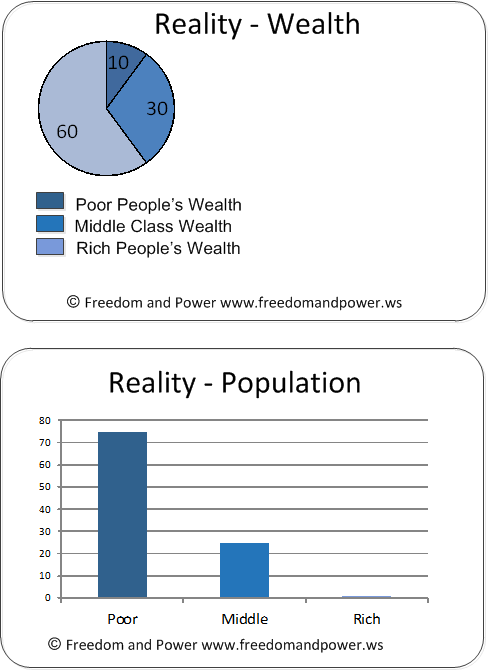
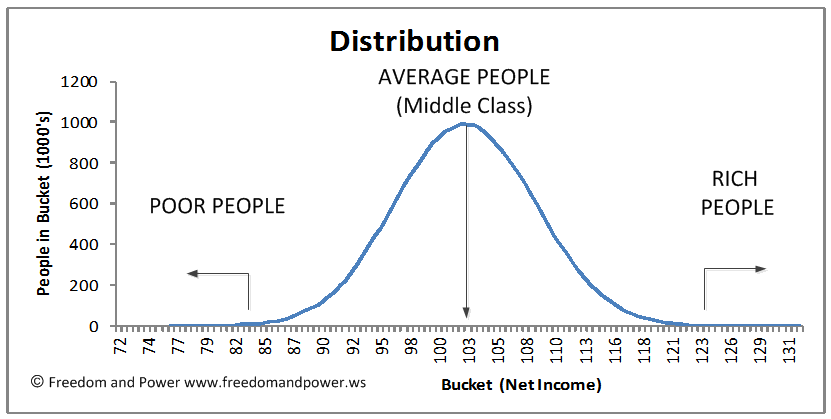
And this is what socialists want
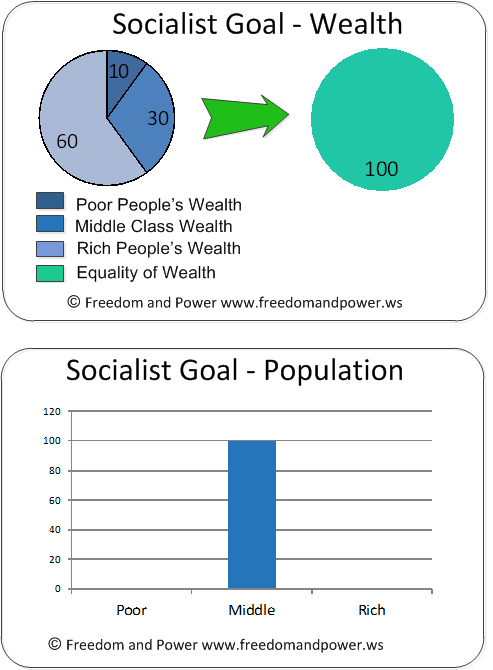
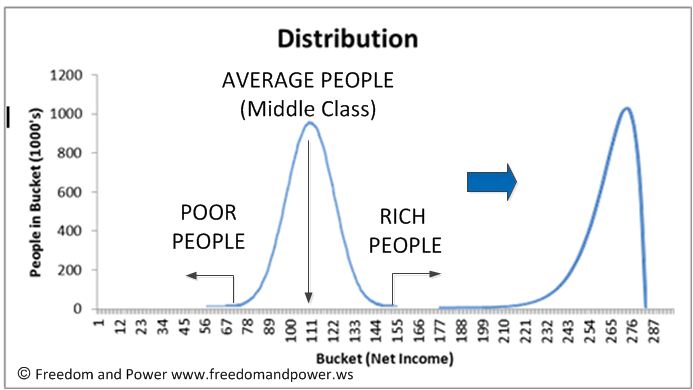
And this is what socialists get
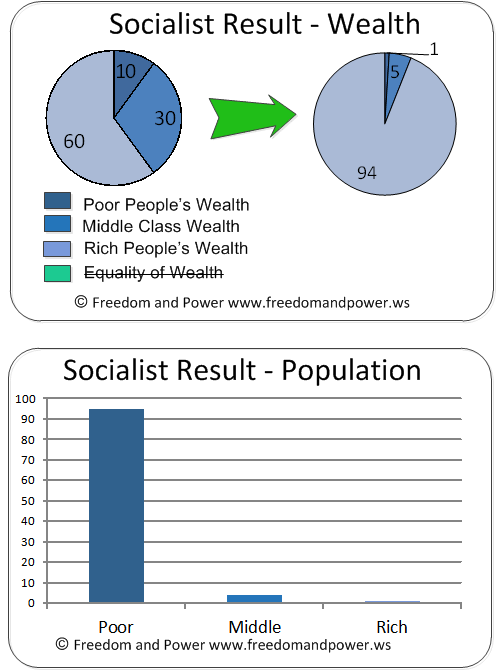
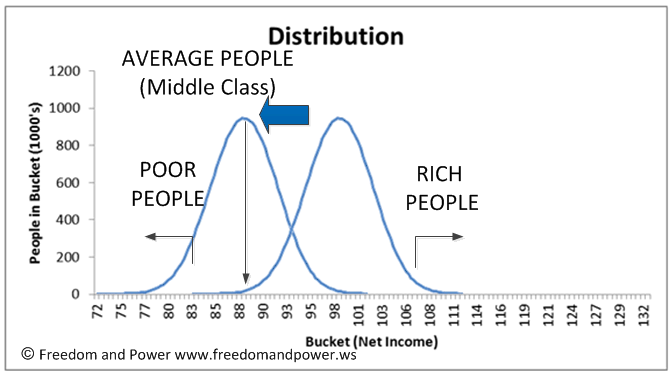
In other words, socialists look at the distribution curve and see a vast gap between "poor" and "rich" people. They try to manipulate the market or even control it, in order to establish a more "equitable" distribution of wealth. However, what they inevitably end up achieving is that everybody's wealth decreases by quite a lot, in an equitable fashion. In other words, they do accomplish what they set themselves up to accomplish, unfortunately everybody is far worse because of it!
The inequality mystery
This is a remarkable effect that requires some explanation. The explanation is simple.
Socialists achieve equitability by taxing rich people and companies and hence preventing all that capital to return to the market and increase. In other words, they are slowing down the creation of wealth.
Communists achieve equitability by controlling the entire economy, but in so doing they are preventing any possible economic calculation (see Communists Can't Count). Because of this, the allocation of resources is highly ineffective, which leads to a widespread economic slowdown.
In other words, the cost of equality is a generalized decrease in wealth. Furthermore, the more equal a society is (in terms of wealth), the lower the wealth it has!
This can be seen in the following picture, where is obvious that the "pie" has shrunk dramatically and therefore everybody (except the elite) becomes poor!
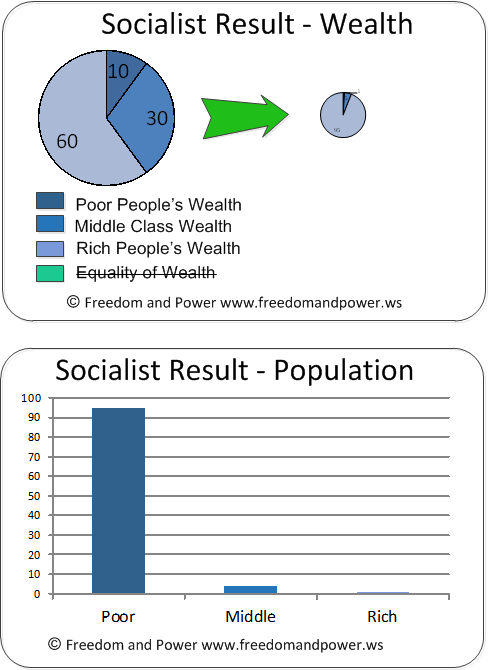
INEQUALITY IN FREE MARKETS
As we have explained in the article Inequality Is The Source Of Wealth, it is inequality what drives higher standards of living. Inequality means an efficient allocation of resources which means maximum satisfaction through choices and quantities of goods and services.
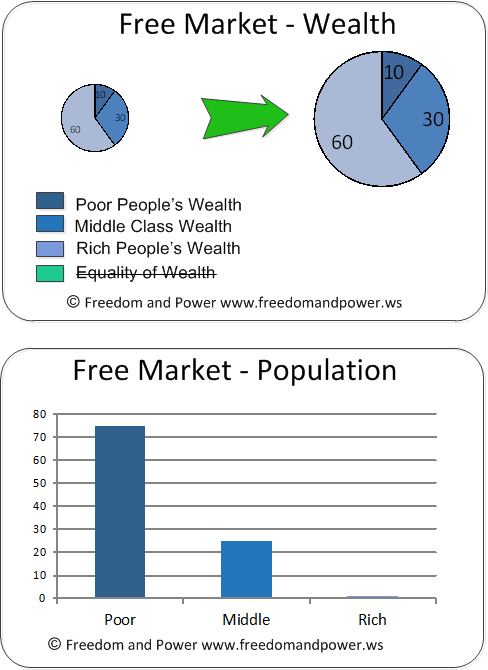
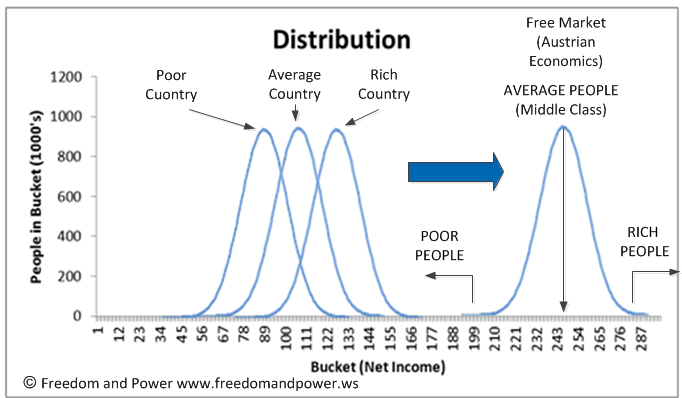
As a consequence of this, free markets typically do not alter inequality, they just increase dramatically the size of the pie, hence making everybody wealthier.
THE EQUALITY / INEQUALITY DEBATE
The debate can be summarized as follows:
In a managed economy it is possible to achieve large amounts of economic equality, but at the price of everybody's quality of life. The opposite is also true. In a free market it is impossible to purposely alter inequality levels, but the benefit of retaining this inequality is that everybody is far richer.
The problem in visualizing this debate is that socialists always speak in relative terms. But the economy does not work in relative terms. You cannot go to a supermarket and purchase goods with relative currency. The cashier won't accept a ratio of 1:1 as payment, they want actual currency!
The size of the economy matters. By making it relative, socialists make it possible to compare one economy or one country with another; the problem is that this comparison is meaningless!
We might as well be using the inequality of rain precipitation or the inequality of population heights; the result will be the same: meaningless.
CONCLUSION
Piketty built a fence that separates socialists/communists from free market advocates. He built this fence with dubious data but even taking this data at face value, suppressing disbelief, and assuming that inequality is indeed a problem, the solution (taxation) is counterproductive!
We have seen above how any attempt to manage the market towards equity, ends up lowering standards of living. Higher taxation will indeed produce a higher equity but at a much, much lower standard of living!
Piketty's book is to be doubt twice. The first reason is because of its suspicious data and the second is because of the incongruent solution he proposes.
We can only hope we manage to provide some illumination into the dark chasms of socialist and monetarist economic thinking. It is your decision now, whether you choose to believe us or them.
Note: please see the Glossary if you are unfamiliar with certain words.

